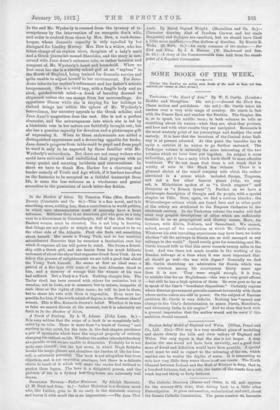SOME BOOKS OF THE WEEK.
frintier nix heading tro notice ouch Boob of the week as have not but TI1011:04 for review in other forme.1 Turkestan: "the Heart of Asia." By W. E. Curtis. (London t Hodder and Stoughton. 12s. not.)—Around the Black Sea. (Same author and publishers. 12s. not.)—Mr. Curtis takes his readers over a very wide range of country. He starts in fact with the Nearer East and reaches the Further. The Caspian Sea is, so to speak, his middle term ; in both volumes ho tells us something about its waters—what they are, what they produce, and how and with what results they are navigated. Roumania is the most westerly point of his journeyings and Andijan the most easterly. It is here that the terminus of the Central Asian Rail- way is at present situated. At this point the traveller has to equip a caravan if he wishes to go further eastward. The Turkestan volume is naturally the more interesting of the two volumes which we have here put together. Its subject is more unfamiliar, and it has a unity which lends itself to more effective treatment. We do not mean that there is not much that is worthy of note in the Black Sea volume. There is a pleasant sketch of the mixed company with which the author associated in a cruise which included Sinope, Trapezus, and not a few other famous places (why, wo may ask, is Mithridates spoken of as "a Greek emperor" and Dionysins as "a Roman tyrant" ?) Further on wo have a, picturesque description of Georgia and its people, with a special chapter on Tiflis, Here, again, wo find a curious blunder : the Wiirtemberger colours which are found here and in other parts of the colony are attributed to the Empress Catharine in the nineteenth century. In the Ttu'kestan volume the reader will find some very graphics descriptions of cities which are sufficiently familiar to us as geographical and literary names, Merv, for instance, with Shiva, Bokhara, and Samarkand. We cannot, indeed, accept all the conclusions at which Mr. Curtis arrives. Whatever his own travelling experiences may have been, we doubt whether " all the railways in Russia are as well managed as any railways in the world." Speed surely goes for something, and Mr. Curtis himself tolls us that this never exceeds twenty miles in the hour. And was there not much trouble in the working of the Russian railways at a time when it was most important that all should go well—the war with Japan ? Generally wo find Mr. Curtis cherishing an admiration for Russia which was more common among his countrymen thirty years ago than it is now. They were stupid enough, it is true, to mistake him for an Englishman—this was a very great affront —but still ho has a high opinion of them. He even goes so far as to speak of the Czar's "beneficent disposition." Certainly regions where Russian .government prevails contrast favourably with those where native rulers are still in power. On the subject of Russian ambition Mr. Curtis is very definite. Nothing has "caused any change in the Czar's determination to annex Persia, Manchuria, and ultimately India to his empire." And we close this book with a general impression that the author would not be sorry if this ambition should succeed.










































 Previous page
Previous page